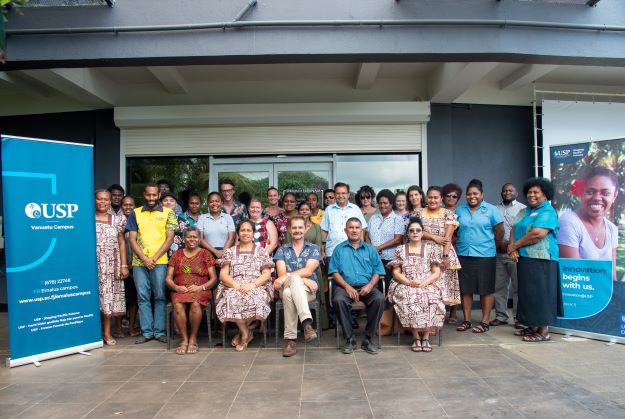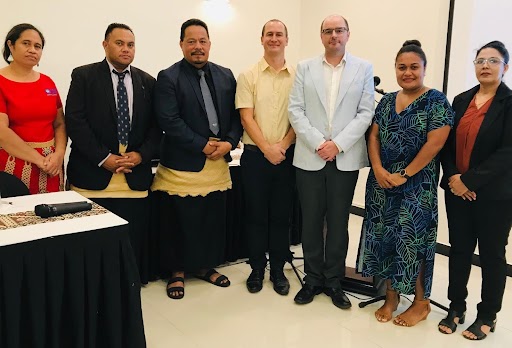Related News

The Pacific Regional Innovation Network (PRIN), an innovative partnership initiative between The University of the South Pacific (USP) and the United Nations Development Programme (UNDP) recently conducted visits to Tonga and Vanuatu as part of giving back PRIN findings to the communities of the two countries.
PRIN was established in 2018 aiming to grow and develop innovation in support of regional development in the Pacific through inclusive and sustainable innovative initiatives. With the success of Fiji Innovation Hub, 2018 – 2019, UNDP extended its PRIN contribution in 2020 in partnership with USP to The Republic of the Marshall Islands (RMI), Tonga, and Vanuatu. These countries have been considered because of their impactful projects on innovation from national and regional perspectives. PRIN 2020 conducted ‘3 in-person national dialogues’ with stakeholders, one in each of the 3 countries, with the aim for a better understanding of innovation and how best to support at the country level. This was followed by provision of coordination support in the 3 countries mainly to connect the dots building more collaboration on innovation.

Later this year, UNDP and USP approved a PRIN GIVE BACK visit to Tonga and Vanuatu. The purpose was to give back the PRIN findings from national dialogues in 2020 to people of Tonga and Vanuatu. During these visits, the team held engagements with various representatives from a range of stakeholders including government, private sector, NGOs, businesses, educational institutions, faith-based organaisation, and youth and women groups. These engagements have set the foundation of building more support and collaboration on innovation at the local level.
The major PRIN GIVE BACK event took back the findings of Tonga Innovation Report and Proposed Innovation Work Plan 2020-2025: Innovating Tonga by unravelling life challenge (fakapona) in the local context in a presentation with stakeholders, members of the community, development partners and international institutions in Tonga on 10 Nov 2022.
The stakeholders who went to Tonga on behalf of USP and UNDP include, Dr. Mele Katea Paea, Ms. Shailin Mala, and Ms. Letila Talemaitonga.
Tonga give-back presentation highlighted the understanding of innovation in the Tongan context as a metaphor of veteki ‘o ha fo‘i fakapona (unravelling of a life challenge). Examples of life challenges that innovative works in Tonga should be focusing on include crises such as COVID-19; natural disasters such as climate change, tsunami, volcanic eruption, educational challenges, environment and ocean challenges, food product challenges, and lack of financial support at all levels as presented during give back talanoa in Tonga.
“These challenges can be addressed through government buy-in, innovative research partnerships and collaboration to find new ways, transferring local ideas/concepts into practice, contextualising foreign ideas and practices, and recognising community innovative voices at the community level,” Dr Paea said.
Meanwhile also present was Mr. Donald Mortimore, the Deputy Australian High Commissioner of Australia High Commission who conveyed that he was excited to see innovation being refigured through PRIN.
“We are very keen to see innovation being mainstreamed across all investments, and across all development work that we do. Innovation could be a game changer and new approaches to older problems. We are really interested in staying involved with this as we move forward”.
Vanuatu PRIN GIVE-BACK presentation on Vanuatu PRIN Report & Proposed Innovation Work Plan 2020 – 2025: Empowering Ni-Vanuatu lives with affordable, accessible and sustainable innovations was held on 24 Nov 2022. It highlighted the understanding of innovation by empowering Ni Vanuatu lives with affordable, accessible and sustainable innovations that translates the ideas into goods and services that creates value for the communities. The need for developments shaped by research evidence, capacity development and training and government interventions remain as a crucial need to advance innovative initiatives in Vanuatu.
“We need USP’s support in research, testing labs and certification of new innovative products like perfumes and oil to bring it to international standards and markets,” said Mr. Ian Bani, Department of Industry and Vanuatu Made Product.
The stakeholders also indicated the need for ethnographic research (non- traditional) by USP to capture social and developmental challenges of Vanuatu communities. “We need to know what people are thinking, their perspectives through ethnographic studies. People don’t see its value until it comes to understanding social and development issues at a local level especially when localizing Sustainable Development Goals” (Mr. Donald Woluseje, UNDP).
The stakeholders who went to Vanuatu on behalf of USP and UNDP include, Dr. Mele Katea Paea, Director Research, Professor Sushil Kumar, Ms. Shailin Mala, and Ms. Letila Talemaitonga.
PRIN is the beginning of a new dialogue on innovation in the Pacific.
-ENDS-